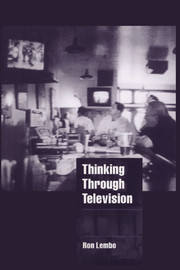Book contents
- Frontmatter
- Contents
- Acknowledgments
- Introduction: Situating my experience with television
- PART I Conceptions of television use
- 1 Social theory
- 2 Social science
- 3 Cultural studies
- PART II Reconceptualizing television use
- PART III Documenting the viewing culture
- Conclusion: The politics of television reconsidered
- References
- Index
1 - Social theory
Published online by Cambridge University Press: 22 September 2009
- Frontmatter
- Contents
- Acknowledgments
- Introduction: Situating my experience with television
- PART I Conceptions of television use
- 1 Social theory
- 2 Social science
- 3 Cultural studies
- PART II Reconceptualizing television use
- PART III Documenting the viewing culture
- Conclusion: The politics of television reconsidered
- References
- Index
Summary
Years ago, in Social Theory and Social Structure, Robert Merton (1968) distinguished between the “European” and “American” traditions in the study of mass media. The former theorized power in broad-based, social structural and historical terms and the latter focused on the systematic, empirical study of “the processes and effects of mass communication” (1968: 498). Writing in the 1960s, Merton believed that a substantial gap existed between the truth claims advanced by social theorists and those of social scientists.
Many years have passed since the time of Merton's assessment of the literature. In the intervening years, much has changed in the analysis of the mass media, including, of course, the emergence of cultural studies and, along with it, a newfound prominence given to interdisciplinary work. Those developments will be the topic of my third chapter. In this chapter and the next, I want to focus attention on the paradigmatic work of social theorists and social scientists in media studies, work that, for a variety of reasons, has fallen outside the purview of cultural studies, but which has nevertheless remained influential in shaping what more mainstream analysts conceptualize as important and document as “real.”
The gap in truth claims that Merton spoke about still exists and continues to divide what is understood as “scientific” and what is not.
- Type
- Chapter
- Information
- Thinking through Television , pp. 17 - 30Publisher: Cambridge University PressPrint publication year: 2000

